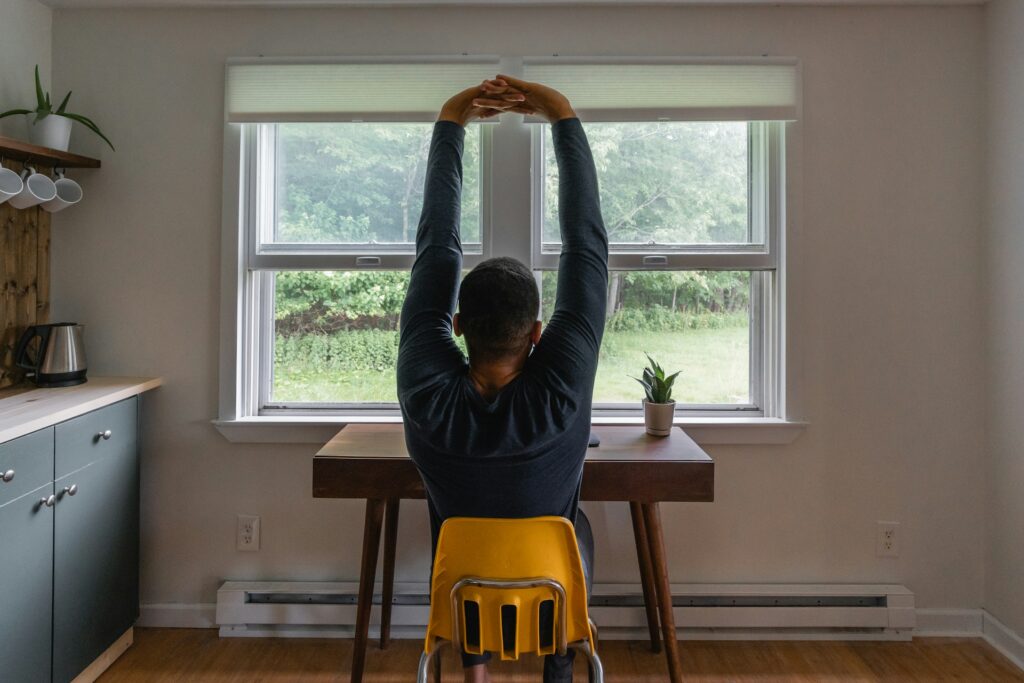Waking up tired doesn’t have to be your default.

You don’t have to hit the snooze a dozen times or hold your eyes open with toothpicks to manage to get out of bed in the morning, and if that’s been the way you’ve been operating, it’s time for a change. A few small tweaks to your habits, both at night and in the morning, can help you start the day feeling genuinely refreshed instead of just surviving until coffee kicks in.
1. Get to bed at the same time every night.

Your body loves rhythm, and going to bed at wildly different times every night throws everything off. Sticking to a regular bedtime, even on weekends, helps your internal clock work more efficiently, which means you wake up feeling naturally more alert.
It doesn’t have to be strict, just consistent. When your body knows when to wind down, it’s easier to get deeper, better-quality rest. That kind of sleep is what leaves you feeling truly restored, not just technically rested.
2. Avoid screens at least 30 minutes before sleep.

That late-night scroll might seem harmless, but all that blue light confuses your brain into thinking it’s still daytime. That makes it harder for your body to produce melatonin, the hormone that helps you fall (and stay) asleep.
Switching to something screen-free before bed, like reading or listening to music, gives your brain a proper signal that it’s time to rest. The better you sleep, the more naturally energised you’ll feel in the morning without needing to jolt yourself awake.
3. Keep your bedroom cool and dark.

Temperature and lighting have a huge impact on how deeply you sleep. A slightly cooler room helps your body relax into sleep more easily, while a dark space supports deeper, more uninterrupted rest. Even small lights — like standby buttons or streetlights — can mess with your sleep quality.
Making your sleep space feel calm and cave-like can lead to noticeably better mornings. You don’t need fancy blackout curtains or gadgets — just a few adjustments to create a space that feels restful rather than distracting.
4. Drink a full glass of water as soon as you wake up.

Dehydration is a sneaky energy-drainer, and after 7–8 hours of sleep with no fluids, your body’s often running low first thing. Drinking a big glass of water right after waking up helps boost circulation, clear mental fog, and kickstart digestion.
It’s such a simple thing, but it wakes up your system in a natural way — no caffeine required. Adding lemon or a pinch of sea salt for minerals can give it a gentle extra boost if you need a little more help getting going.
5. Let natural light in early.

Sunlight is one of the most powerful signals your body uses to reset its internal clock. When you get natural light first thing, even just a few minutes by a window, it helps regulate your hormones, especially cortisol and melatonin, which directly affect your energy levels.
If it’s dark out when you wake up, turning on warm indoor lights or using a sunrise alarm clock can help simulate that effect. The goal is to give your body a clear “morning has arrived” message, which makes it easier to feel alert and focused.
6. Move your body, even a little.

Morning movement gets your blood flowing and helps shake off that heavy, groggy feeling. It doesn’t have to be a full workout — a quick stretch, walk, or yoga flow is enough to wake up your muscles and signal your brain that it’s time to start the day. A bit of light movement improves circulation and oxygen flow, which helps your energy pick up naturally. Plus, it can help you feel more grounded before you dive into the rest of your day.
7. Avoid hitting snooze repeatedly.

It’s tempting to sneak in a few extra minutes of sleep, but that interrupted rest often makes you feel worse. Each time you hit snooze and drift back off, you’re starting a new sleep cycle you won’t have time to finish, which can leave you feeling even groggier. It’s better to set your alarm for the latest time you can realistically get up and commit to rising then. That way, your brain isn’t stuck in a cycle of false starts. After a while, you’ll start feeling more refreshed at that first alarm.
8. Eat something with protein early on.

Skipping breakfast or only grabbing sugar-heavy foods can lead to energy crashes mid-morning. Adding some protein, even just eggs, yogurt, or nut butter, helps balance your blood sugar and gives your brain and body something more sustainable to work with.
It doesn’t have to be a big meal. Just something to stabilise your system and avoid the highs and lows that come from only relying on caffeine or carbs to get going. That balanced start makes a noticeable difference in how long your energy actually lasts.
9. Don’t check your phone right away.

Diving into notifications first thing throws your brain straight into reaction mode. It hijacks your focus, spikes stress hormones, and can leave you feeling scattered before you’ve even got out of bed. It’s not a calm or intentional way to begin the day.
Giving yourself even ten minutes of quiet before checking your phone can create a small buffer that changes the whole tone of your morning. You start from a place of clarity instead of overwhelm, and that sets the tone for your energy, too.
10. Give yourself something to look forward to.

Energy isn’t just physical; it’s emotional. Starting your day with a small spark of joy, even something simple like a podcast you love, a playlist, or your favourite coffee routine, can give your mood (and motivation) a serious lift.
When you have something to wake up for, even if it’s small, you’re more likely to rise with purpose instead of dread. Those little pockets of happiness matter more than we often realise, especially on groggy mornings.


